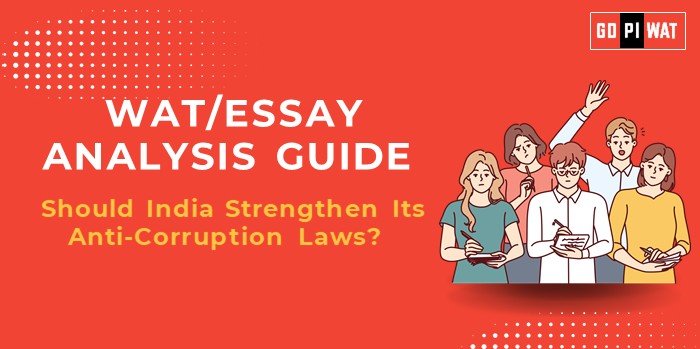📋 Written Ability Test (WAT) Analysis Guide: Should India Strengthen Its Anti-Corruption Laws?
🌐 Understanding the Topic’s Importance
Anti-corruption laws significantly impact economic efficiency, foreign investment, and social justice. For B-school students, understanding governance and ethical frameworks is critical for leadership roles, emphasizing how robust anti-corruption frameworks can enhance trust, fairness, and growth.
📝 Effective Planning and Writing
- ⏱️ Time Allocation:
- Planning: 5 minutes
- Writing: 20 minutes
- Reviewing: 5 minutes
- 📋 Structure:
- Introduction: 70 words
- Body: 350 words
- Conclusion: 80 words
🎯 Introduction Techniques for Essays
- ⚖️ Contrast Approach: “While India’s economic reforms have attracted global attention, its corruption ranking of 85 in 2023 highlights persistent governance challenges.”
- 🔧 Problem-Solution Approach: “Corruption in India undermines public trust and economic progress. Strengthening anti-corruption laws can be a game-changer.”
📊 Structuring the Essay Body
1. Achievements:
- 💳 Direct Benefit Transfer (DBT): Reduced leakages in welfare schemes, saving billions annually.
- 📜 Right to Information (RTI): Empowered citizens to hold authorities accountable.
2. Challenges:
- ⚖️ Judicial Delays: Corruption cases often drag on for years, weakening deterrence.
- 🔍 Weak Enforcement: Agencies like CBI face allegations of political interference.
3. Future Outlook:
- 🤝 Independent Investigative Bodies: Grant autonomy to agencies like CBI and Lokpal for unbiased investigations.
- ⏳ Fast-Track Courts: Expedite corruption cases to ensure timely justice.
- 💻 Digital Monitoring: Use AI and blockchain for transparent procurement and tracking of public funds.
📖 Concluding Effectively
- ⚖️ Balanced Perspective: “Stronger anti-corruption laws, combined with institutional reforms and public engagement, can transform governance.”
- 🌍 Visionary Approach: “India’s success against corruption will set a global benchmark, fostering trust and growth.”
💡 Recommendations for Sustainable Progress
- ⚖️ Institutional independence for agencies like CBI to eliminate political interference.
- 📢 Increased public participation through digital platforms to ensure accountability.
- 🌍 Learning from global models like Singapore’s Corrupt Practices Investigation Bureau (CPIB) for effective enforcement.
📄 Sample Short Essays
1. Balanced Perspective: “India needs stronger anti-corruption laws, but their effectiveness hinges on unbiased enforcement and systemic reforms.”
2. Solution-Oriented: “Institutional independence, transparency in procurement, and fast-track courts are essential for combating corruption effectively.”
3. Global Comparison: “Singapore’s low corruption rate exemplifies how stringent laws and unbiased enforcement can foster integrity.”


